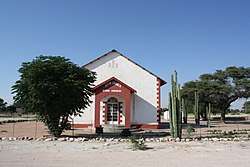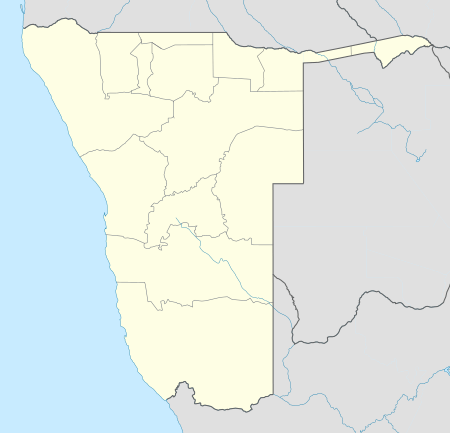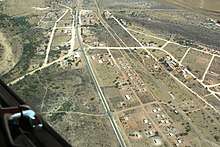Witvlei
Witvlei (Afrikaans: White marsh) is a village in Okarukambe Constituency in the Omaheke Region of central-eastern Namibia. It is situated on the B6 150 kilometres (93 mi) from Windhoek on the way to Gobabis. It is known for producing high quality meat.[1]
Witvlei ǃUri ǃKhubus | |
|---|---|
Village | |
 Witvlei AFM church | |
 Witvlei Location in Namibia | |
| Coordinates: 22°24′59″S 18°29′49″E | |
| Country | |
| Region | Omaheke Region |
| Constituency | Okarukambe Constituency |
| Elevation | 4,751 ft (1,448 m) |
| Time zone | UTC+2 (SAST) |
| Climate | BSh |

.jpg)
History
The original name of the village in Khoekhoegowab (Damara/Nama) is ǃUri ǃKhubus (white fountain).[2]
The settlement was the place of the Battle of Witvlei in the First Herero-Nama War in March 1864. Maharero, with the help of the hunter Frederick Green (known among the Ovaherero as Kerina), led a contingent of 1,400 Ovaherero from Otjimbingwe against the Orlam Afrikaners under Jan Jonker Afrikaner. Afrikaner's forces were defeated and fled, although a number of other battles followed elsewhere.[3][4]
Economy and infrastructure
Witvlei Meat was inaugurated in August 2006 and was for several years the only significant employer and taxpayer in the village.[5] The abattoir has a slaughter capacity of 27,000 cattle annually.[6] Financial problems and arguments with Namibia's biggest meat producer MeatCo over the export quota to Norway led to a closure of the abattoir in 2014.[7] It was set to reopen in 2016 but remains closed as of May 2017.[8]
The Witvlei Street Kids Center was inaugurated in the village in 2001. The regional council donated an empty, un-serviced plot to the project in November 2004, and in December 2005 the center was built with money donated by the Suiderhof Dutch Reformed Church congregation and various individuals and companies. Two pre-fabricated houses were transported from Windhoek all the way to Witvlei.[9]
Politics
Witvlei is governed by a village council that has five seats.[10]
The 2010 local authority election was won by SWAPO which gained three seats. One seat each was won by the Rally for Democracy and Progress (RDP) and the United Democratic Front (UDF).[11] SWAPO also gained three seats (344 votes) in the 2015 local authority election. UDF and the Democratic Turnhalle Alliance (DTA) won one seat each with 125 and 72 votes, respectively.[12]
Weather and climate
Witvlei receives an average of 317.7 millimetres (12.51 in) of rainfall per year. In the 2010s drought, the lowest figure was 67 millimetres (2.6 in) in the 2018/2019 rainy season.[13]
People
Most of the inhabitants of Witvlei are of Damara descent, but there are also Ovambo, Herero, people from Kavango, a few Himbas, and many more inhabitants of mixed ethnicity.[2]
External links
| Wikimedia Commons has media related to Witvlei. |
References
- Namibian beef soon hits EU market Afrol, Last accessed 28 February 2013
- Kangueehi, Kuvee (10 March 2005). "Abattoir a Glimpse of Hope Where There is None". New Era.
- Tonchi, Victor L; Lindeke, William Alfred; Grotpeter, John J (2012). Historical Dictionary of Namibia. African historical dictionaries. Scarecrow Press. p. 153. ISBN 9780810853980.
- Shampapi, Shiremo (14 October 2011). "Maharero kaTjamuaha: The Consolidator of the Ovaherero Polity (1820-1890) Part II". New Era.
- David, Rosalia (January–February 2016). "Witvlei Meat closure leaves council in precarious position". Prime Focus magazine.
- Schlechter, Deon (27 February 2013). "Witvlei Abattoir". New Era. pp. 11–12.
- "Witvlei Meat wins back access to abattoir". The Namibian. 8 April 2016. p. 3.
- Kavangua, Ngaevarue (19 May 2017). "Agribank defies court order on Witvlei Meat". New Era. p. 1.
- "Witvlei street kids center". NG Church Suiderhof. 27 February 2013.
- "Know Your Local Authority". Election Watch (3). Institute for Public Policy Research. 2015. p. 4.
- Konjore, Romanus (25 February 2013). "Witvlei's woes continue". The Namibian.
- "Local elections results". Electoral Commission of Namibia. 28 November 2015. p. 5.
- Menges, Werner; Oliveira, Yokany (23 May 2019). "Khomas faces worst drought in 90 years". The Namibian. p. 1.